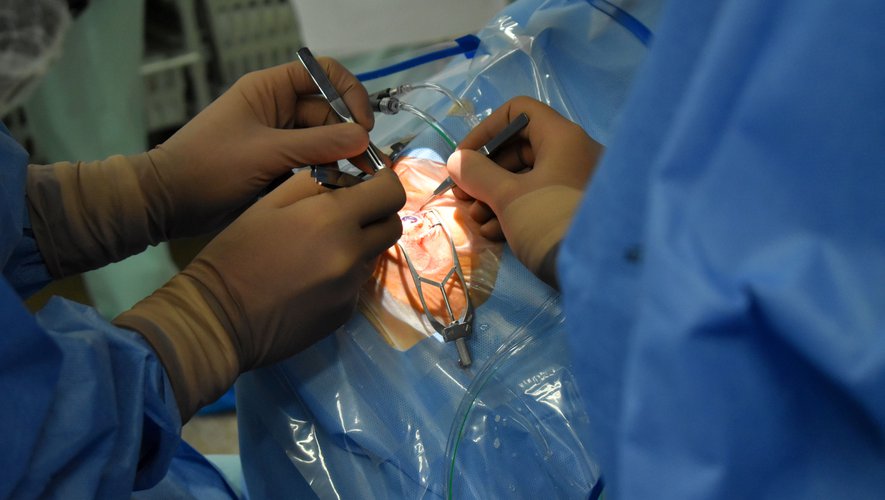Professor Vincent Daine, Head of the Department of Ophthalmology at Montpellier University Hospital, placed an artificial cornea on Wednesday morning in a 38-year-old patient who was almost blind in one eye. This is the fifth such intervention in the world. It is part of a clinical trial that will include about thirty patients around the world through the end of the year. The prosthesis was developed in Israel by Dr. Gilad Litvin, who is today in Montpellier. With great hope: restore sight.
Restoring sight for people who have lost the sight of one eye, or nearly, after an attack on the cornea: the crazy, but now realistic, hope runs through Montpellier.
On Wednesday, November 10, Professor Vincent Daine, Head of the Department of Ophthalmology at the University Hospital of Montpellier, placed an artificial cornea on a 38-year-old man from Bordeaux who could only see lights and blurry shapes, since the cornea in her right was destroyed by herpes that left a long scar her ten years ago. An artificial cornea developed by the Israeli company Cor Neat could allow him to see again.
“Everything went well, with precise steps due to the novelty of the operation. From Thursday we will have a very specific idea of the outcome. I hope this patient, who can no longer see, will distinguish between the five fingers of his hand”, summarizes Professor Dayne after a little more than three hours of intervention, under the supervision of Dr. Gilland Litvin, inventor of the prosthetic, of Israel.
Patients who are not eligible for transplant
The device is now experimental, and is part of a clinical trial, which will be offered to 30 patients worldwide by the end of the year. At the University Hospital of Montpellier, one of the two French centers to test the device, together with the Adolphe de Rothschild Ophthalmology Foundation, under the direction of Professor Eric Gabison, seven artificial corneas will be placed.
The cornea is essential to vision
When damaged after trauma, due to the protrusion of a toxic product, eye disease, infection, exposure to radiation … the cornea, the transparent membrane that covers the iris, can cause vision loss, even blindness: this is what allows light to pass into the retina.
The first artificial cornea transplant in France was performed in 2009 at AP-HM, in Marseille. The result is not convincing. The Israeli prosthesis is particularly promising, “it has wide optics, of excellent quality, surrounded by nanoscale tissues that reproduce human tissue, which will allow for good integration into the eye,” emphasizes Vincent Daine.
“We do not have epidemiological data, but damage to the cornea is a major cause of blindness. Every year, 7000 transplants are performed in France, but 20% cannot be used, because they refuse the transplant, or because it is not possible, which is what It was this young man, who was challenged with a corneal transplant and without a solution, due to the destruction of nerves at the corneal level”Professor Dane explains.
For him, this is the first: “There have been experiments with artificial corneas, and all of them have not worked. The only option today is a Boston corneal replacement, but it’s a hybrid system, on corneal tissue, with a lot of complications”, recalls a confident doctor of the cornea from Israel, which does not pose a risk of rejection, with a substance that perfectly adapts to the eye.
“We see glare reaching the retina again”On Wednesday, he was excited, at the end of the intervention, guided by a rigorous educational program with the main steps: removing the damaged cornea, or even centering the new cornea, “it is necessary so that the patient does not have a distortion of vision.” Dr. Litvin recalls that the first Israeli patient to have surgery last January, at the age of 78, has been suffering from progressive blindness for ten years, and has regained his sight. For Vincent Dane, “We can hope for ten-tenths of the man who had the operation on Wednesday.”
‘We are in the learning phase’
Dr. Litvin, you are in charge of the clinical trial center for this cornea in Israel, how was it developed?
We worked on it for six years, and after developing a prototype, we had to find a maker to develop it. We first performed tests on animals, especially rabbits, before placing prosthetics in humans. Two weeks ago, we were in Paris for the installation of the first prosthesis in France.
Five patients have now benefited from it, so what was the result?
The first patient, a 78-year-old who was transplanted in Israel earlier this year, regained his sight, as did the second, who is in his 30s. However, we had to suspend the trial on the third Israeli patient, who was not in good health. In addition to France, tests are allowed at two centers in Canada and the Netherlands. It will take a year to know if the procedure is safe.
How did the intervention go this morning in Montpellier?
Very well, but I’m here to keep improving the technique, to see what doesn’t work. We are still in the learning phase, explaining that every time to the patient, what you did yesterday with the young man who had surgery today. He had no solution, he wanted it.

“Subtly charming problem solver. Extreme tv enthusiast. Web scholar. Evil beer expert. Music nerd. Food junkie.”


